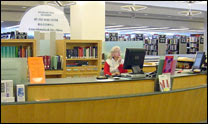To try out the new database we did a search for KALW, the call letters of the the first permanent FM radio station to broadcast west of the Rockies.
Variety, December 4, 1940 from the Entertainment Industry Magazine Archive
San Francisco.--J. E. Morgan, until recently production manager of KSFO, is new head of the radio department at the Samuel Gompers Trade School here. Giving instruction in FM, using the school's new FM transmitter, KALW, as exhibit A.
A photograph of the Samuel Gompers Trade School from our San Francisco Historical Photograph Collection shows radio towers atop the structure. The building is still extant and is part of the City College of San Francisco Mission Campus.
The main purpose of the station was to train public school students to become radio technicians. At this time FM radio was still a very novel technology and there were very few transmitters and receivers.
Variety, August 10, 1940.
KALW was preceded by a temporary FM station - W10XLV - transmitting programs 15 hours a day during the National Association of Broadcasters meeting in August 1940.
The following year, a Variety article announced that KALW would be carrying educational program from the CBS radio network.
Variety, October 29, 1941
The American School of the Air was a half hour long educational program that ran from 1930 through 1948. In some school districts it was required listening schools and at times was incorporated into the school curriculum.
With the cooperation of CBS affiliate KSFO, the program was broadcast by the San Francisco Unified School District's station KALW into FM receivers that were placed in classrooms around the district.
A San Francisco Chronicle article reported that ss of August 1941 only George Washington High School had FM receivers with San Francisco Junior College (City College today), Portola Junior High School and Hawthorne Elementary School scheduled to receive theirs soon. At the time these receivers were rare and expensive (they sold for around $100 or the equivalent of more than $2000 today). Is it possible that Samuel Gompers Trade School students also learned how to build FM receivers?
Broadcasting, Telecasting, December 23, 1946
At the outset, FM stations broadcast on 42-44 megacycle band of the radio spectrum. KALW's original frequency was 42.1 megacycles. In 1945, the Federal Communications Commission made a decision to move FM to the frequency range between 88 and 108 megacycles. This became the standard that all FM receiving equipment has followed ever since. After a temporary move to 44.3 megacycles, in 1948 KALW landed at its present location on the radio dial at 91.7 megacycles.
Boyer, Anne, "Your Little Red Schoolhouse May Be Wired for Sound," San Francisco Chronicle August 30, 1941.
Dunning, John, On The Air: The Encyclopedia of Old-Time Radio (Oxford University Press, 1998).
"Public Notice, July 17, 1940," Federal Communications Commission.
Speegle, Paul, "Those Appeals for Funds Create Quite A Problem, San Francisco Chronicle July 5, 1948.
Sterling, Christopher H. and Michael C. Keith, Sounds of Change: A History of FM Broadcasting in America (University of North Carolina Press, 2008).











No comments:
Post a Comment